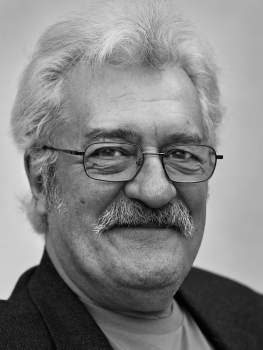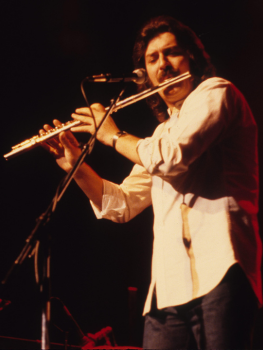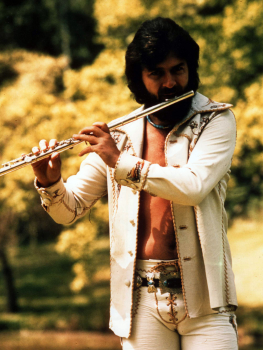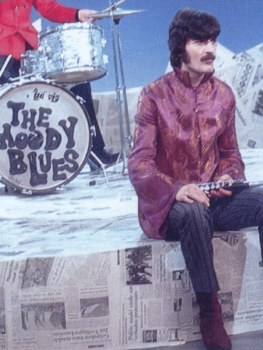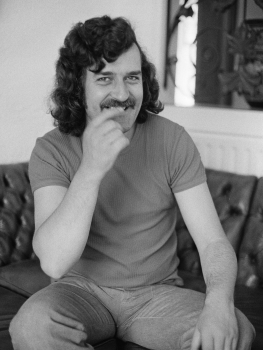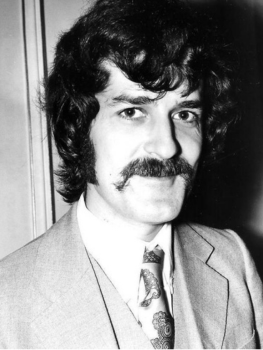RAY THOMAS
Ray Thomas was born 2 years and 89 days after the start of WWII, on December 29th, 1941 in Lickhill Manor, Stourport-on-Severn.

The Manor wasn't the family home but one commandeered during the war to take the overflow of expectant mothers so they could deliver safely away from the bombings in Birmingham. At some point in history, the area around Stourport-on-Severn had belonged to Wales. Coupled with Ray's father's family coming from the southwest corner of Wales, he has always considered himself to be Welsh first and always.
His Father sparked Ray's musical interest when he taught him to play the harmonica at the age of 9. (Ray's father was not a classically trained flautist as erroneously reported in a music magazine!). He took his music interest a step further when he joined the school choir at age 10. Leaving school at the age of 14, Ray briefly left music on the shelf by becoming a tool maker trainee at Lemarks. By 16, he went in search of a band and within two years had left the trade behind to start his career as a full time musician....a career that would last over 40 years.
Ray’s music career started with THE SAINTS & SINNERS which were formed by Mike Brassington in March 1958. The band called it quits in June 1959.
That same year Ray along side Mike Pinder and John Lodge (Bryan Betteridge, Mike Heard, Rob Sheward) formed EL RIOT & THE REBELS. The Saints and Sinners gave Ray a taste of being center stage. The band entered and won several competitions. Ray developed his trademark entrance of sliding across the stage on his knees. He once took out a row of potted tulips! They landed several spots on the popular TV show “Lunchbox”. Their first appearance was on November 14th, 1962 playing “Guitar Tango” and “I Remember You”. At some point a 78 rpm acetate was recorded of “Blue Moon” and “Down the Line”. On April 15th, 1963, El Riot and the Rebels performed at The Riverside Dancing Club in Tenbury Wells as the support band for a group that would change the face of Rock n Roll forever. It was a little band from Liverpool - The Beatles. By October 1963, Ray decided it was time to quit the day job and go pro in the rock music world.
1963 Ray and Mike had a short lived stint in the band the Krew Kats.
Fast forward to 1964 Ray and Mike were on the hunt and looking to start a new band.
Denny Laine, guitarist/ singer, formerly of the Diplomats was then living with Graeme Edge, drummer, formerly of Gerry Levene and the Avengers. The two teamed up with Thomas and Pinder and Clint Warwick, bass, formerly of The Dukes, to form the R & B group, THE MOODY BLUES FIVE. The Five was subsequently dropped, the band would forever after be THE MOODY BLUES. In no time at all, the Moodies were taking Birmingham by storm. A demo acetate sent over from the States was to give the band a number one chart busting song. “Go Now” by Bessie Banks was rearranged by the band and released in November 1964. The next single didn’t fare so well. Released in May 1965, “Bottom of My Heart” was the first song on which Ray played flute, alto flute. “Magnificent Moodies” the first and only album of the Mach I Moodies was released on July 22nd, 1965. The lads were still very popular in the clubs and appeared on several TV shows, including ‘Ready, Steady Go!’, ‘Saturday Club’ and ‘Shindig Goes to London’. On December 3rd, the band embarked on a 9 date England tour as the support group for their good friends, THE BEATLES. After the first rush of success with ‘Go Now’ the band just couldn’t seem to find another hit. By September 1966, Clint Warwick had decided to leave as living in London and touring was taking a toll on his family. Denny Laine was not long behind him, leaving in October to pursue a solo career. Once again Ray and Mike were left to find replacements for their band.
John Lodge, Ray’s friend from El Riot days, was enlisted to replace Clint as bass player. Ray ran into Eric Burdon of the Animals at a pub one night and mentioned they were looking for a guitar player. Eric had just run an ad in The Melody Maker magazine but had hired a guitar player before the ad even came out. He said he’d be glad to send over the dozen or so letters he’d received inquiring about the position.
The first letter they opened was from a Justin Hayward. Mike called Justin up and explained how they had received his info and would he like to do an audition. Within days, the Mach II version of the Moody Blues was complete. It would take a few gigs to convince the 5 that R & B wasn’t the way for them to go, it was time to change the path of the band. They started writing music for a stage show, a complete change from the ‘Go Now’ days. Before they had completed the new music they were summoned to Decca. The band was in debt to Decca, in return for forgiving this debt, Decca wanted The Moody Blues to record a rock version of Dvoraks “New World Symphony”. It would be a collaboration with world renown conductor Peter Knight. Decca would release it on the Deram Records label to demonstrate their new Deramic Sound. It was not something the lads were particularly interested in doing but in those days it was almost impossible to get studio time to record an entire album. The most the studio would allow was 3 hours to do a single and a B side. Enter Tony Clarke.
Tony was a junior producer with Decca and a musician and he was assigned to the Moody Blues to produce their part of the demo record. Behind closed doors, the Moodies presented their stage show to Tony as what they really wanted to record. Tony convinced Peter Knight to go along with this new recording. The Dvorak scheme was literally hijacked with Tony Clarke putting his job and career on the line. The finished album was presented to the Decca board, who were horrified but another champion in the form of one Hugh Mendl stepped forward to back the album, ‘Days of Future Passed’. To everyone’s relief the album took the music world by storm. It was the start of progressive rock with the album climbing to number 27 in the UK album charts. Five years later it would hit number 3 in the US Billboard Charts. The Moody Blues were a cutting edge band with a mellotron (Mike Pinder) a rock flute (Ray Thomas) and songs that flowed one into the other. A format that drove dj’s mad as they were use to playing singles that began and ended when they should. The Moody Blues recorded 7 albums between 1967 and 1972. By the time the last album, Seventh Sojourn was released on 17 November 1972 the band decided they needed a break. They had been virtually living in each others pockets for 5 years and the strain of touring was beginning to take it’s toll.
By 1977 Decca hierarchy was calling for a reunion album by the Moody Blues. Mike Pinder was living in California then and had no desire to move back to the UK. If there was going to be a reunion record then the Moodies would have to go to the states. Everyone, including Tony Clarke, known as the 6th Moody, packed their bags, their instruments and their families and took off for a one year trial in southern California. From the beginning there were problems. The first studio burned to the ground, the second flooded. Tony Clarke had to depart before the album was finished for personal reasons. “Octave” the 8th and final album by the second Moody Blues line-up was released on June 9th, 1978. That was great news to fans that had been waiting 6 long years for a new album but the bad news was that Mike Pinder wasn’t coming back .
A world tour was already set so a replacement keyboardist was found in the person of Patrick Moraz, formerly of Yes. After two more albums, ‘Long Distance Voyager - 1981 and ‘The Present’ - 1983, produced by Pip Williams the band hired Tony Visconti to be their producer and take them in yet another musical direction, more fitting the pop style of the time. ‘The Other Side of Life’ - 1986 and ‘Sur la Mer’ - 1988, were basically Blue Jays’ albums with no Ray participation in either album and Graeme in only one. The band continued to tour extensively, with a huge fan base in the US. It was 3 years before they released another album that included Ray Thomas. ‘Keys of the Kingdom’ had three different producers and seemed to be rather a patchwork of songs, as if the band couldn’t decide in which direction to head. With the 1992 Red Rocks concert which included the Colorado Symphony Orchestra conducted by Larry Baird, the band had a resurgence of popularity. The orchestra tour continued for a year with the band performing in front of local orchestras led by Baird. In 1999 they were off to Italy to record a self-produced album, “Strange Times”. It was to be the last album on which Thomas would perform before his retirement.
Ray had already decided at age 55 that he would retire from touring at age 60. Shortly before his 61 birthday in December 2002, Ray informed the rest of the band that he would no longer be going out on tours. He wished them all the best for continued success as they carried on with the music and the magic of the Moody Blues, the band that he and Mike Pinder had pulled together all those years ago.
The Moodies still tour several times a year and have produced one album, ‘December’ in 2003.
In July 2009 it became known that Thomas had written at least two of his songs– "Adam and I" and "My Little Lovely"– for his son and his grandson Robert, respectively. It was also revealed that he had married again, to his longtime girlfriend Lee Lightle, in a ceremony at the Church of the Holy Cross in Mwnt, Ceredigion Wales, on July 9th, 2009.
Thomas released his two solo albums, remastered, in a boxset on 24 September 2010. The set includes, with the two albums, a remastered quad version of "From Mighty Oaks", a new song "The Trouble With Memories", a previously unseen promo video of "High Above My Head" and an interview conducted by fellow Moody Blues founder Mike Pinder. The boxset was released through Esoteric Recordings/Cherry Red Records.
In October 2014, Thomas posted this statement on his website:
After the tragic death of Alvin Stardust and the brave response to Prostate Awareness by his widow, Julie, in following up on what Alvin had intended to say about the disease, I have decided to help in some small way. I was diagnosed in September 2013 with prostate cancer. My cancer was in-operable but I have a fantastic doctor who immediately started me on a new treatment that has had 90% success rate. The cancer is being held in remission but I'll be receiving this treatment for the rest of my life. I have four close friends who have all endured some kind of surgery or treatment for this cancer and all are doing well. While I don't like to talk publicly about my health problems, after Alvin's death, I decided it was time I spoke out. A cancer diagnosis can shake your world and your family's but if caught in time it can be cured or held in remission. I urge all males to get tested NOW. Don't put it off by thinking it won't happen to me. It needs to be caught early. It's only a blood test – a few minutes out your day to save yourself from this disease. Love and God Bless, Ray.
In later years Thomas resumed flute playing with other musicians, one instance of which was for the song "L'urlo nelle ossa", on the 2016 album Eros & Thanatos by Italian band Syndone. He also played flute on the track "Simply Magic" on John Lodge's 2015 album 10,000 Light Years Ago and recorded with Moody Bluegrass.
Thomas died on January 4th, 2018, six days after his 76th birthday, at his home in Surrey. The official announcement, made by his record company, did not give any cause.
"Ray was my best pal. I met Ray when I was 14. We were two young kids from Birmingham who were reaching for the stars — and I think we got there. I'm really pleased that Ray was around to know we'd be inducted into the Rock and Roll Hall of Fame. I spoke to Ray just before Christmas — because his birthday was after Christmas, on the 29th — and we had a long conversation. We're very close friends — or were very close friends. Very sad. Very, very sad."
Thomas was posthumously inducted into the Rock and Roll Hall of Fame, as a member of The Moody Blues, in April 2018.
